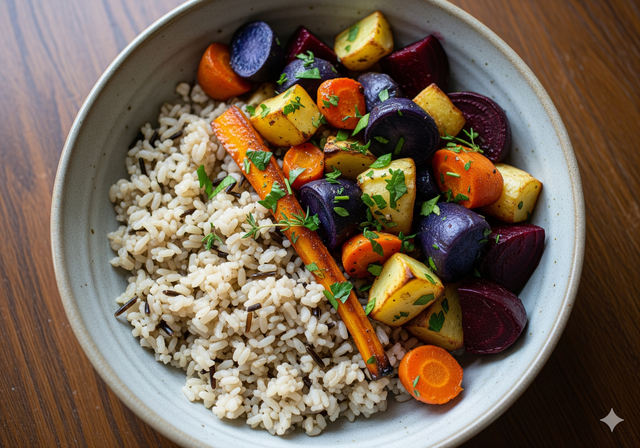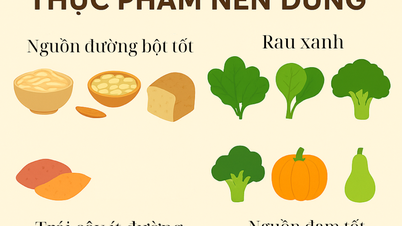Starch - essential fuel
Carbs are one of three macronutrient groups that provide glucose to the brain and muscles. They should make up 45-65% of your total daily energy intake.
Dr. Julie Stefanski, an American clinical nutritionist, emphasized: Adults need at least 130 grams of starch per day to maintain basic activities.

Whole grain rice, tubers... are very good for health.
Photo: AI
How does the body react to a lack of starch? Within 24 - 48 hours of cutting carbs, the glycogen stored in the liver and muscles is depleted. Because glycogen retains water, weight loss occurs rapidly, mainly due to dehydration. The body then has to break down muscle tissue and burn fat for energy, putting the body into a state of ketosis.
According to expert Samantha Coogan (University of Nevada, USA), ketosis can help in the short term but if prolonged, it will disrupt hormones, affect the liver, thyroid and blood sugar, according to the health news site Verywell Health.
Common side effects. Cutting carbs can cause “keto flu” with fatigue, nausea, headaches, and difficulty concentrating. In the short term, it can cause constipation, insomnia, and irritability. In the long term, it can cause electrolyte imbalance, high cholesterol, kidney stones, and osteoporosis. In people with diabetes, ketosis can lead to ketoacidosis, a life-threatening condition.
Is rapid weight loss sustainable?
Some studies have noted that in the first few months, weight loss is faster and blood sugar control is better. However, expert Stefanski notes: after 1 year, the effectiveness between low-carb and balanced diets is almost the same. The biggest drawback of rapid weight loss is that it is difficult to maintain long-term, while the risk of malnutrition is higher.
Risk of malnutrition
Eliminating starch means eliminating food sources such as brown rice, tubers, etc. This can easily lead to a lack of vitamin C, folate, B vitamins, fiber, and antioxidants, increasing the risk of heart disease, digestive disorders, and even some cancers.
Why is starch necessary?
Carbs not only provide energy but also support muscle recovery, tissue regeneration, and endurance. Foods rich in good starches such as brown rice, sweet potatoes, oats, beans, and vegetables also provide essential vitamins, fiber, and minerals, according to Verywell Health.
Advice from the experts
Avoiding rice completely is not a safe solution. Instead, choose good starches such as brown rice, oats, sweet potatoes, beans, fruits, and vegetables. These foods provide sustainable energy, rich in fiber, vitamins, and minerals. At the same time, combine with a balanced, sustainable diet to control weight and long-term health.
Source: https://thanhnien.vn/so-map-kieng-tinh-bot-dieu-gi-thuc-su-dien-ra-trong-co-the-185250911233650125.htm



![[Photo] Where the history of resistance comes alive with modern technology at "95 years of the Party Flag lighting the way"](https://vphoto.vietnam.vn/thumb/1200x675/vietnam/resource/IMAGE/2025/9/12/81c1276f52b849c8b16e2d01dd1c85e4)


![[Ảnh] Chủ tịch nước Lương Cường tiếp Bộ trưởng Quốc phòng Thổ Nhĩ Kỳ Yasar Guler](https://vphoto.vietnam.vn/thumb/1200x675/vietnam/resource/IMAGE/2025/9/11/7f1882ca40ac40118f3c417c802a80da)

![[Photo] General Secretary To Lam chairs the Politburo's working session with the Standing Committee of the National Assembly Party Committee](https://vphoto.vietnam.vn/thumb/1200x675/vietnam/resource/IMAGE/2025/9/11/e2033912ce7a4251baba705afb4d413c)






















































































Comment (0)